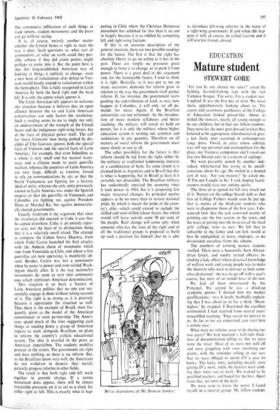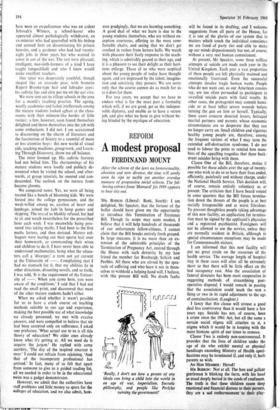Mature student
EDUCATION STEWERT GORE
'Are you by any chance my tutor?' asked the balding, learned-looking type with the rich Viennese brogue. 'I'm sorry, I'm a student too. I replied. It was the first day of term. We stood there, apprehensively looking about us. The courts and cavernous gatehouses of the College of Education looked prison-like. About us milled the inmates, nearly all young enough to be our children, but in fact our fellow-students. They were for the most part dressed in what they believed to be appropriate schoolmasterish gear: a few lively ones cavorted in contemporary fancy dress. Florid, in attire whose sobriety was still too personal and cosmopolitan for the place, my Viennese companion and I stood out like two blasted oaks in a canyon of saplings.
We were presently joined by another indi- vidual, white-haired but trying to be unself- conscious about his age. He smiled in a hunted sort of way. 'Are you mature?' he asked me. 'If I'm not I ought to be,' I said, hoping faceti- ousness would raise our sinking spirits.
The three of us agreed we felt very much out of it. Notices on the college boards told us that lists of College Fathers would soon be put up, that is, names of the third-year students who were to chaperone those of the first year. I dis- covered later that the task consisted mainly of pointing out the low taverns in the town, and the ways of getting into the hetaerea of the local girls' college, sister to ours. We felt that to subscribe to the father and son lark would at best be undignified, at worst, improper, so we dissociated ourselves from the scheme.
The numbers of arriving mature students swelled. There were a housewife, born Alexan- drian Greek, and sundry retired officers, in- cluding a lady officer whose practical knowledge of welfare work and young people was to make the theorists who were to instruct us look some- what desiccated : she was to get off with a year's course, but most of us would have to do two.
We had all been interviewed by the Principal. We agreed he was a dried-up academic gnome. I showed him my mod4st qualifications: two A levels, bashfully explain- ing that I was about to sit for a third. 'Mean- ingless,' he snapped. I flourished the excellent testimonials I had received from several years' unqualified teaching. 'They are of no interest to us. As far as we are concerned, you start here a tabula rasa.'
What were we tabulae ra.sae to do during our two years? We had received a half-inch thick- ness of documentation telling us, but we were none the wiser. Most of us were not well off and were grappling with sums involving our grants, with the reminder tolling in our ears that we were obliged to spend £35 a year on books. The lucky ones, including myself, were getting £9 a week, while the luckiest were send- ing their wives out to work. We wanted to be qualified teachers, and hoped for the best. Apart from that, we were in the dark.
We were soon to know the worst. I found myself in a tutorial group. My fellow-students here were an ex-policeman who was an ardent Jehovah's Witness, a school-leaver who appeared almost pathologically withdrawn, an ex-minister who had quarrelled with his bishop and seemed bent on disseminating his private heresies, and a gardener who had had twenty- eight jobs in three years but who wanted to come in out of the wet. The rest were pleasant, intelligent, neo-sixth-formers of a kind I have taught (unqualified) and who I knew would make excellent teachers.
Our tutor was desperately youthful, though shaped like an avocado pear, with brunette Rupert Brooke-type hair and labrador eyes: his sadistic lips and chin put me on the qui vive.
We were sent out to village schools in the area for a month's teaching practice. The ageing, woolly academics and failed intellectuals among the mature students looked aghast at the class- rooms with their minnow-like hordes of little rustics : a few, however, soon found themselves delighted and threw themselves into the job with some enthusiasm. I did not. I am accustomed to discoursing on the charm of literature and the fascination of history to a roomful of more or less attentive boys: this new world of visual aids, teaching machines, group work, and Learn- ing Through Discovery, threw me off balance.
• The tutor loomed up. His sadistic features had not belied him. The shortcomings of his mature students were loudly and publicly de- nounced when he visited the school, and after- wards, at group tutorials, he sneered and con- descended. The outlook on the mature front became gloomy.
We compared notes. Yes, we were all being treated like a bunch of blooming kids. We were forced into the college gymnasium, and the weak-willed among us, careless of heart and lumbago, joined the lads 'in hoop games and skipping. The rest of us blankly refused, but had to sit and watch nevertheless for the prescribed hour each week. I was meanwhile being pres- sured into taking maths. I had been to the first maths lecture, and then desisted. Mature col- leagues were tearing out their sparse hair over their homework, or commanding their wives and children -to do it. I have never been able to understand mathematics, being what the educa- tors call a `diverger,' a term not yet current at the University of —. Complaining that I had no stomach for it, that my abilities lie in other directions, dissecting novels, and so forth, I was told, 'It is the requirement of the Univer- sity of —. When you came here, you were aware of the conditions.' I said that I had not read the small print, and discovered that most of the other mature students hadn't either.
When we asked whether it wasn't possible for us to have a crash course on teaching methods suitable to our age and experience, making the best possible use of what knowledge we already possessed, we met with evasive answers, and were compelled to believe that vle had been accepted only on sufferance. I asked one professor, 'What actual use to us is all this theory of education? We older ones already know what it's getting at. All we need do is acquire the jargon.' He replied with some acerbity, 'The day of the inspired amateur is over.' I could not refrain from rejoining, 'And that of the incompetent professional has arrived.' In fact, many of us felt that apart from someone to give us a guided reading list, all we needed in order to be in the educational swim was a gadget demonstrator.
However, we admit that the authorities have staff problems and little money to spare for the colleges of education, and we also admit, how- ever grudgingly, that we are learning something. A good deal of what we learn is due to the young students themselves, who are without ex- ception courteous, offering us the most com- fortable chairs, and seeing that we don't get crushed in rushes from lecture halls. We watch with pleasure their lively response to the teach- ing, which is admirably geared to their age, and it is a pleasure to see their delight as their hori- zons enlarge. Those of us who were sceptical about the young people of today have thought again, and are impressed by the talent, imagina- tion and sensitivity they possess. We are sorry only that the course cannot do as much for us • as it does for them.
For two years, we accept that we have to endure what is for the most part a formality which will, if we are good, get us the indispen- sable diploma, and enable us to have a secure job, and give what we have to give without be- ing blinded by the mystique of education.



































 Previous page
Previous page